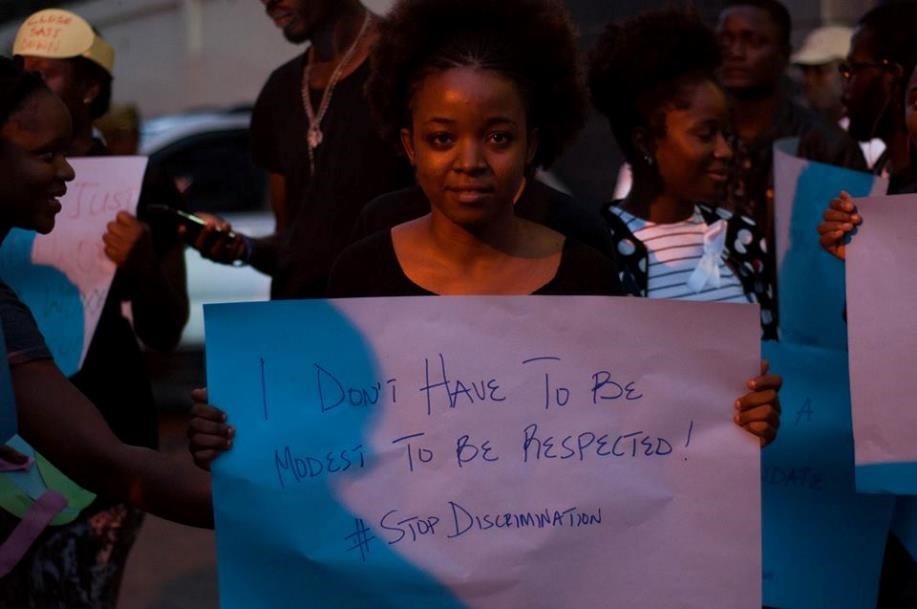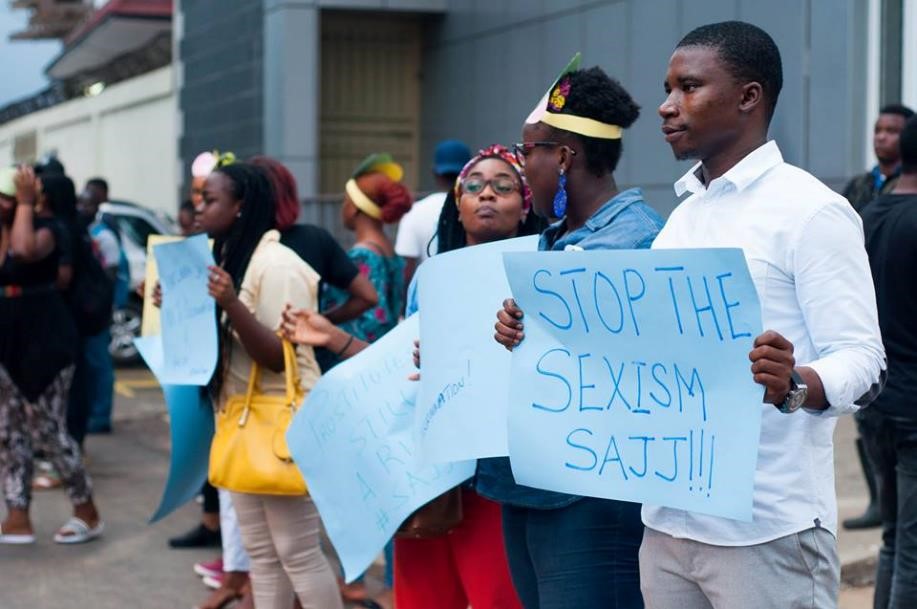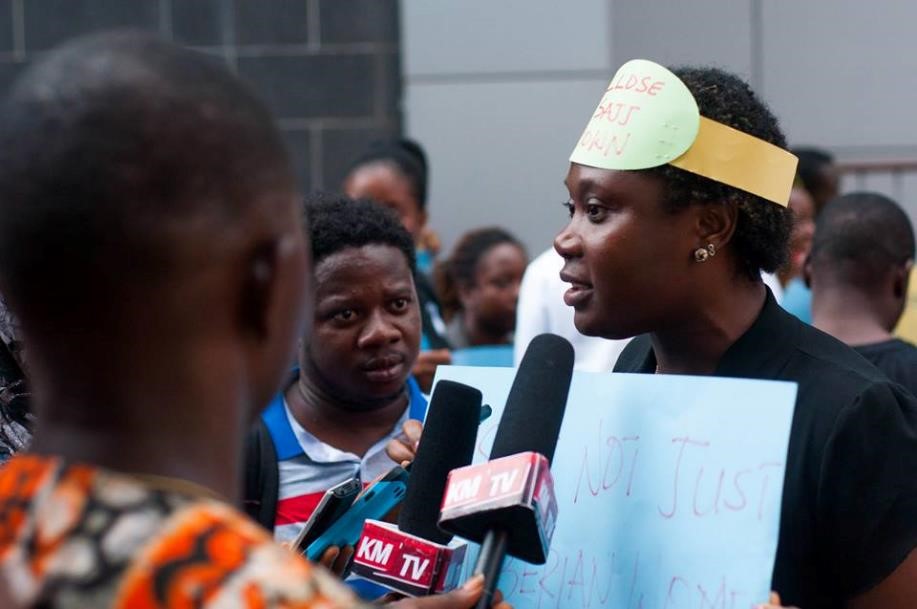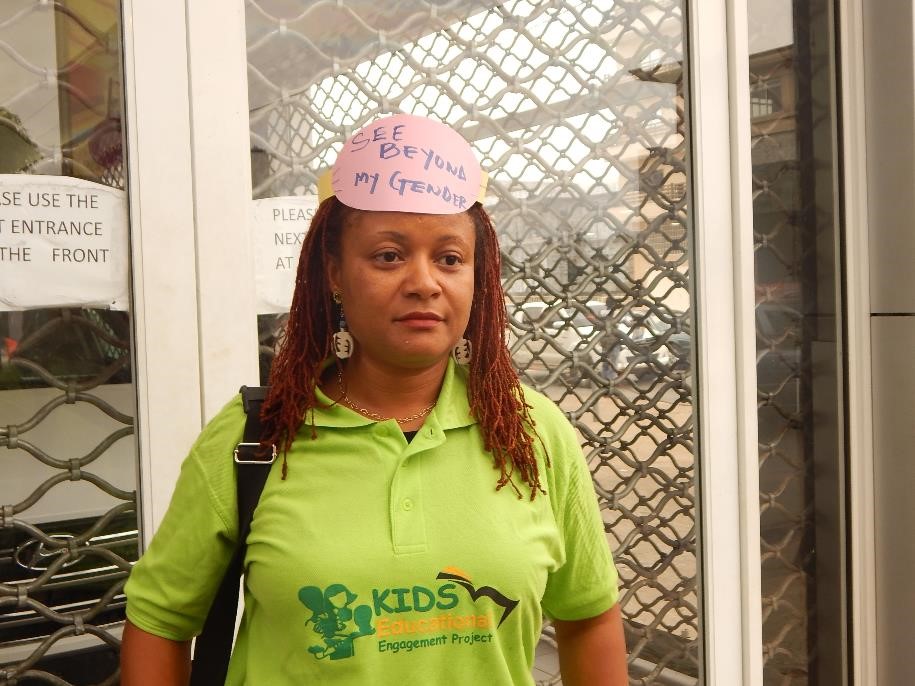MONROVIA, Montserrado – The government of Liberia on Friday evening ordered the immediate closure of Sajj House Restaurant on 18th street in Sinkor, following hours of protest calling for the change of what they say is a discriminatory policy practiced by the business.
The assistant minister for tourism, Princess Turkolon, told journalists following a brief discussion with Sajj’s managers on Friday that the decision to close down the restaurant was triggered by growing complaints that it was discriminating against black women.
Turkolon said in her brief discussion with the restaurant management that the manager admitted to the allegations but said it was the security guards who were discriminating against the women. However, she questioned how security guards would enforce such an unauthorized mandate for several years without the notice of the restaurant’s management.
Turkolon said the restaurant would remain closed until a conclusion can be reached on further steps to be taken.
“Right now, it’s not even about investigation, this is something even my ministers have gone through, and we have been hearing that,†she said, although she did not name which ministers had been affected by the restaurant’s discriminatory policy.
She said the restaurant’s policy was damaging to the country’s tourism industry.
The protest, which began around 5:00 p.m., according to organizers, was meant to inform Sajj’s management and other institutions with discriminatory policies against any person that Liberians will not accept being treated as second-class citizens in their own country. The protest lasted for several hours despite a heavy downpour of rain.
Among them were victims of the restaurant’s discriminatory policy, feminist and prominent women rights advocates, including the head of the Liberian Women Situation Room and coordinator of the Angie Brooks International Center for Women’s Empowerment, Leadership Development, International Peace and Security, Yvette Chesson-Wreh.
Other prominent women present included the entrepreneur, Barkue Tubman-Zawolo; the executive coordinator for Paramount Women Initiative, Facia Harris; the executive director of the Kids Educational Engagement Project, Brenda Brewer-Moore; the former assistant labor minister for administration, Moriah Yeakula; and the former assistant youth and sports minister, Kula Fofana.
Although many of the victims disclosed that the discrimination has existed for nearly a decade, the situation got public attention last Friday when three young Liberian women reported that they were discriminated against at the restaurant because they were black women who were not accompanied by males.
Satta Wahab, the founder and CEO of Naz Naturals, which produces organic shea butter-based hair care products in Liberia, told The Bush Chicken on Monday that she and two other young colleagues, Shari Raji, an engineer at Sime Darby Oil Palm Plantation, and Letitia Gibson, also an entrepreneur, were declined entry to the restaurant at the restaurant’s Salsa Night event.
Wahab said what added insult to injury was that on the same night, a single white woman was allowed to enter the restaurant while she was still arguing with the guard. When she asked him why the single white woman was allowed to enter, Wahab said the guard’s excuse was that the woman was a customer.
Meanwhile, Kou Dolo, a former manager at Kendeja Resort, who also claimed that she was humiliated at the restaurant in 2013, said she is happy that the business was closed.
Dolo said she had boycotted the restaurant for more than four years.
“Even though the owner came and apologized to me because he knows me personally, I never came back. So, I was not in the mood of protest; I was not supporting a boycott. Close down Sajj for what they have been doing over six years,†she said.
She said it is unacceptable for any establishment in the country to discriminate against Liberian women.
However, it seems that the demands of the organizers of the protest are yet to be met, despite the temporary closure.
Gibson, who is one of the three young ladies who raised the alarm over the restaurant’s policy said the temporary closure was only for further discussions between the government and the restaurant management. She said a meeting would be held today to determine their next course of action.
Shari Raji, who read a petition statement signed by more than 500 individuals, said the petitioners are demanding an official public apology from the restaurant management and an official announcement in print, radio, and posted on the restaurant’s premises acknowledging the discriminatory policy against women was now abolished and indicating the new measures that will replace the current “disruptive policy.â€
Until these demands are met, she said they would continue to campaign a boycott of the restaurant.
“Legally, they can regulate crowd control due to space limitations but [it] should not be based on race, gender or any discriminatory reasons,†she said.
Yeakula, the former assistant labor minister, said although the situation at the restaurant has received huge criticism on social media, the protest would create more awareness.
“We want them to accept the fact that their policy will not be respected if they’re discriminatory and we will challenge it,†she said.
Brewer-Moore, the executive director of the Kids Educational Engagement Project, said she joined the protest because she and some friends were affected by Sajj’s discrimination in 2017 when they were similarly prevented from the restaurant’s premises on the grounds that they were not accompanied by males.
“I was not entirely surprised when I saw the post from the three young ladies that had the situation last weekend,†she said. “I think this kind of practice is counterproductive to the society we are trying to build, and I know that they need to stop it.â€
She said her quest for joining the protest was to encourage the restaurant to stop the discriminatory, racist, and sexist practice and allow entry to anyone who is capable of paying for their services.
Julateh Mulbah, another protester who said she experienced discrimination at the restaurant in 2014, said she had promised herself that she would be at the forefront of any movement against Sajj’s policy.
“I think if Sajj management had understood the issue of diversity and being tolerant to other people, they couldn’t have gone to that extent,†she said. “But, it’s the issue of knowledge. They lack that knowledge to understand that you should tolerate other groups of people no matter who they are. There are instances where guys have fought in clubs, but you don’t ban all men from going in, so that is stereotyping, it shouldn’t be encouraged.â€
Barkue Tubman, the owner of businesses such as Peace Café and Capital Room, told reporters she was supporting the protest because she would not accept being humiliated by such discrimination.
She said while the discrimination was hurtful because the act was being carried out by a foreign-owned business against Liberians, discrimination because of sex and race was wrong regardless of who owns the business.
“There are young Liberians working in that business. The last thing we want is for them not to be able to take care of their families,†she said. “We’re just asking management to take ownership and come to the table, talk to the women that are out here, talk to the patrons who they may have wronged, and let them also say to us maybe there is a reason they’re doing what they’re doing, and why they think what they’re doing is right.â€
While the restaurant’s policy only affected women, other men also joined the protest in solidarity of the Liberia women.
Gboimah Gbenegbanyan, a man who joined his wife to protest, said he was against Sajj’s policy because he is a Liberian and married to a Liberian woman, in addition to having a mother and siblings who are women.
Gbenegbanyan said even though none of his relatives had been directly affected by the policy, he was joining the fight because he believes that discrimination against one Liberian woman is discrimination against all.
“I am here to call on Sajj to stop discrimination against Liberian women and [it] must stop now,†he said.
“Our sisters are tired of this. At night, we are sleeping, and they are calling us to bring them out because they want to come to the most favorite places they want to go but they are restricted. You need to stop this, please. We are humans, we are not blacks and whites,†another male protestor was heard saying.
Chesson-Wreh, the head of the Liberian Women Situation Room, described the situation as unacceptable because Liberia was not under an apartheid arrangement where there is a separation of blacks from white.
She said she learned about the protest while out of the country and upon arrival, decided to join the action because the policy affects every Liberian woman.

Yvette Chesson-Wreh, head of the Liberian Women Situation Room and coordinator of the Angie Brooks International Center for Women’s Empowerment, Leadership Development, International Peace and Security. Photo: Lloyd Massah
“We are women of Liberia, and this country has peace because of the women of Liberia,†she said. “We will be respected in our country; we will have access to all public spaces; it’s our fundamental right and it will happen.â€
Sajj House Restaurant’s owner, Milat Hajj, who only came out to meet the protestors following the arrival of Chesson-Wreh, apologized to the women for the discrimination meted against them.
In addition to his open apology, his lawyer, Preston Chea Dolo, also disclosed that the management has already begun to effect changes in its policy.
“Those changes are: nobody – absolutely nobody – is going to be stopped at the gate except for being in possession of arms and whatever weapons, including knives or whatever it is,†he said.
“That is the only search that will still be in place. That I am sure is reasonable enough for them to accept,†he added. According to him, the search would be done using a metal detector to promote a safe environment.

Owner of Sajj Restaurant, Milat Hajj, and Preston Chea Dolo of Thelma Law and Associates. Photo: Lloyd Massah
The lawyer further added, “The irony of this whole thing about life is, no amount of money can change what has happened, except to say sorry.â€
Featured photo by Lloyd Massah






